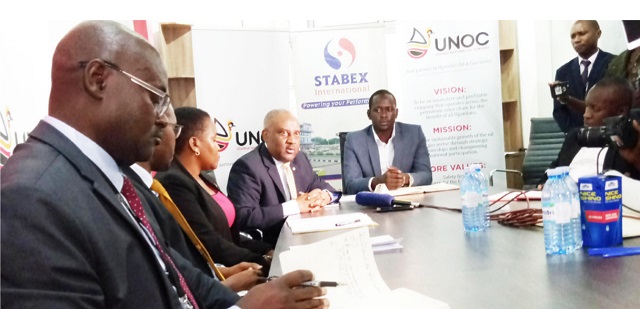
Executives say they are in not to compete but to complement private sector investments
Kampala, Uganda | JULIUS BUSINGE | Uganda National Oil Company Limited (UNOC) has started its bulk trading of petroleum products business countrywide.
Under this trading, company executives say that they will import and sell petroleum products in bulk to registered local oil marketing companies in the country.
The move is also expected to strategically position UNOC with government support within the petroleum products supply chain as the country moves to realize first oil a few years from now.
Whereas some market players have welcomed this development, analysts say it will pose direct competition to private sector players.
Those supporting the move say, it will also enhance the security of petroleum products supplies into Uganda while delivering sustainable value propositions to the OMCs subsequently benefiting the people.
Stabex International, with 50 petrol stations across the country, was the first local fuel retailer to serve as a customer for UNOC under this arrangement. For the start, it will deliver 400, 000 litres and will gradually increase on this capacity.
Executives from UNOC, Stabex and the Minister of Energy and Mineral Development, Mary Kitutu, officially signed the MoUs in Nansana, a Kampala suburb, at the headquarters of Stabex on March 16.
Under the terms and conditions in this partnership, officials said, UNOC will import and sell to Stabex, a fraction of their monthly fuel requirements as per the agreed terms and conditions.
The maiden order is to be delivered before the end of this month. According to Peter Muliisa, the UNOC chief legal and corporate affairs, the company is negotiating with strategic partners to enhance its customer value proposition which will be presented to the OMCs as it strives to handle a favorable fraction of the fuel imports into Uganda.
Kitutu (the energy minister) welcomed the new development. “I am glad that the company has taken a step in the right direction,” she said. She added that this move will support UNOC’s mandate of managing the commercial interests of the state in the petroleum sector.
She also said, it will enhance the country’s security of supply for petroleum products and withstand external shocks. The imports will be stored at the Jinja Storage Terminal (JST) which has capacity of holding 30 million litres of petroleum products.
This government facility has been underutilized for the last 20 years. Imports will also be stored at the Kampala Storage Terminal (KST) in Buloba, some 30 kilometers away from Kampala city centre once its construction is complete.
Meanwhile, government plans to invest a total of $71million in the KST. It also plans to rehabilitate and improve the JST at a cost of $12 million.
The UNOC bulk trading activities are also in response to growth in demand of refined petroleum products.
Data from the ministry of energy indicates that Uganda consumes about 6 million liters of petroleum products a day. Demand has been growing at an average of 9% in the 6-10 years and without enough storage facilities the country risks recording spikes in prices.
Sometime in 2007, Uganda recorded an over 100% jump in pump prices due to shortage of fuel caused by the chaotic 2007 Kenyan post-election violence that cut off importation of the product through Mombasa Port.
The country’s installed storage capacity is about 104 million litres, of which 30 million litres (29%) capacity is at JST. The other 71% is constituted by various small capacity storage facilities.
Kitutu also said that Uganda, apart from the internal market, there is significant forward market that Uganda is positioned to supply including South Sudan, Rwanda, and DRC. This market continues to grow.
“It is important that UNOC strategically positions itself to participate in this growing market,” Kitutu said, “this can bring in money to the treasury.”
“I urge UNOC to ensure consistency, timely delivery of quality petroleum products and excellence as they embark on this journey,” she said, “Profits are dependent on happy clients,” she added. To achieve this, she urged the Board of Directors of UNOC to take keen interest in this activity and to keep those with authority updated on the progress of this trading exercise.
Emmanuel Katongole, the Board Chairperson for UNOC and Proscovia Nabbanja, the UNOC chief executive officer, said the move was in accordance with the mandate of handling the government’s commercial interests across the petroleum value chain.
Nabbanja said that the move was one of UNOC’s downstream projects alongside petroleum products storage terminals and pipeline developments.
Stabex General Manager, Daniel Cherutich does not look at UNOC as a competitor but as one partner to deliver petroleum products needs of Uganda. He said UNOC’s strategic approach to implement its mandate and the shared long term goals gave Stabex the confidence to sign up as the first customer.
****
 The Independent Uganda: You get the Truth we Pay the Price
The Independent Uganda: You get the Truth we Pay the Price


